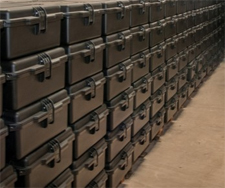Lapis, the PR unit of Afghanistan media conglomerate Moby Group, has picked up a six-figure pact with the United Nations to tout biometric voting in the critical 2014 Yemen elections.
 Voting kits arrive in Yemen. Photo: UN |
The massive electoral undertaking involves training 45,000 temporary employees for the voter registration process.
Yemen's stability is seen as crucial to the U.S. and its European allies for its oil reserves, location on oil shipping routs, and struggles with Al Qaeda-linked militant groups. The country also faces a regional divide that has some groups urging a split into self-governing federations.
Lapis won a $200K contract for the voter education campaign, following an RFP process.
Moby Group's holdings include Afghanistan TV and radio properties, production facilities, an English-language magazine, Afghan Scene, and the online news site Quqnoos. Founder Saad Mohseni was dubbed by the New Yorker in 2010 as Afghanistan's "first media mogul."
South Korea's Suprema and Gemalto of The Netherlands won contracts with the Yemeni government to supply scanners and voting units for the election.
Yemen's 2012 presidential election include only one candidate, Vice President Abd Rabbuh Mansur Hadi, who took over after Saleh's resignation in 2011.



 Have a comment? Send it to
Have a comment? Send it to 
No comments have been submitted for this story yet.